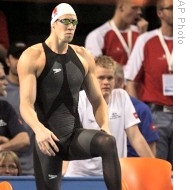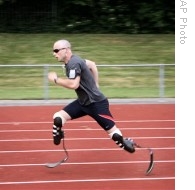VOA标准英语2008年-Use of High-Tech Tools Raise Ethical Concerns a
搜索关注在线英语听力室公众号:tingroom,领取免费英语资料大礼包。
(单词翻译)
By Brian Padden
Washington
16 June 2008
In August, national teams from more than 200 nations from Afghanistan to Zimbabwe will gather in Beijing for the summer Olympics. The games promotes themselves as more than just a sporting event. The Olympic charter advocates ethics1 and fair play. How to ensure fair play has been the topic of much debate. There is unanimous opposition2 to the use of performance enhancing drugs mostly because they give athletes unfair advantage. VOA's Brian Padden reports the use of technology in training and competition is also being examined to see if it gives some athletes an unfair edge. (Part 3 of 5)
While in Cairo, Egyptian sprinter3 Amr Seoud says he trains without using any special technology. "There is no latest technology at all. I am just training. I have a track and some spiked4 shoes," says Seoud.
But coach Medhat Nabi points out that training methods and even the track are more modern than a generation ago. "In the past, we used to run on a sand field. There was no 'tartan' synthetic5 track," he says, "and timing6 was done manually."
Technology has long been used in sports to improve athletic7 performance, even if it gives the winning edge to athletes and countries that are technologically8 advanced.
At the U.S. Olympic training facility in Colorado Springs, gymnast Todd Thornton uses a digital video system to improve his technique.
"For the majority of my career I have trained without this system. I can tell you, our coaches can tell us all day long that we are doing something wrong, but if it feels right to us we are not going to know unless we see it," said Thornton. "It gives us that advantage to be able to see what we are doing."
Peter Vint, a sports technologist with the U.S. Olympic Committee, says individual sports federations10 determine what is a fair application of technology in both training and competition.
"For example, not an Olympic sport but certainly the PGA [Professional Golfers' Association of America] has set specific regulations on how golf balls and how golf clubs can perform. And they set very specific guidelines on what you can and cannot use in those competitions. To that extent they are trying to preserve some fundamental aspect of the purity of the game," says Vint.
 |
| Alain Bernard of France prepares to start the men's 50m freestyle semifinal at the European Swimming Championships in Eindhoven, wearing LZR Racer made by Speedo (File) |
Decisions regarding technology in sports are sometimes complicated and controversial. The International Sports Federation9 approved the use of a high-tech11 swimsuit called the LZR Racer made by Speedo. Researcher Deb Yeomans explains how it works.
"It reduces form drag when the swimmer is swimming. So form drag is making you as tubeless a shape as possible through the water, so it squashes things in. And two, it helps maintain the athlete's body position in the water," explained researcher Deb Yeomans.
Athletes wearing the suit have broken more than 20 world records since February. Critics have called the swimsuits Techno-doping.
And South African double-amputee Oscar Pistorius won an arbitration12, allowing him to compete as a sprinter using a prosthetic leg with a special racing13 blade as a foot.
"I think this day is going to go down in history for the equality of disabled people," he said.
 |
| Double-amputee sprinter Oscar Pistorius trains for the Dutch Open Paralympics event in Emmeloord, Netherlands (File) |
He had been barred by the International Association of Athletics14 Federations. It claimed his carbon fiber15 prosthetics would allow him to run faster without working as hard as he would on two legs.
While innovative16 technology can present new ethical17 dilemmas18, sports technologist Peter Vint says sports federations are guided by enduring principles.
"To preserve the integrity of the competition, not let it be dictated19 by one technology over another, then I think we've done justice to the sports and the athletes," he said.
Despite advances in technology, Olympic officials are confidant that in the end the competition will be decided20 by the ability and determination of the athletes.
 收听单词发音
收听单词发音 




